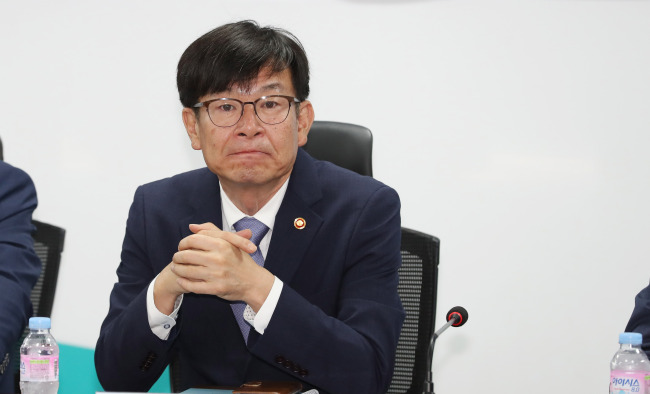South Korea's corporate watchdog said Tuesday that it has decided to give up its own right to file complaints about some major cases such as price rigging in a move to support effective law enforcement and better protect consumers' rights.
Under the current Fair Trade Act, the Fair Trade Commission is the only entity that can bring an antitrust trade case to court through the state prosecutors' office. The law is aimed at preventing a flood of lawsuits being filed against firms by individuals and civic groups, which the business community claims could hurt their normal operations.
FTC Chairman Kim Sang-jo, a renowned former civic activist, has constantly vowed to change the rule as part of the watchdog's key policy goal of establishing fairer market competition and shared growth between conglomerates and smaller businesses.
 |
(Yonhap) |
Under the agreement with the Justice Ministry, the FTC's exclusive complaint rights against unfair acts such as price rigging, bidding collusion and market division will be scrapped.
"Such collusions are anti-society acts that hurt consumers," Kim said. "We need to take stern measures against such behavior."
The corporate watchdog will handle general antitrust cases, while the ministry will investigate major cases that have far-reaching impacts on the economy and society as a whole.
There has been persistent criticism that the FTC has been too reluctant to exercise its exclusive right to deal with antitrust activities.
The move is also part of the FTC's efforts to revise the country's fair trade law. Earlier, the corporate watchdog said it would review 17 key issues, such as competition, and iron out a revision draft which will be proposed to the National Assembly in September.
The current fair trade law, enacted in 1980, has come under fire for failing to reflect the latest industry trends and better protect the rights of consumers.
In a policy meeting with officials from the ruling Democratic Party, the FTC agreed to get tough on unfair business practices by the country's family-controlled business groups or chaebol.
South Korean fair trade law forbids inside deals aimed at giving unfair support to affiliates under the wing of a conglomerate. Family-run business groups have used such intra-company deals to help companies run by owner family members win lucrative contracts and earn huge sums of money.
The FTC said earlier it would seek to revise the law forbidding inter-affiliate trading within a business group whose owner and family hold 30 percent or more of listed affiliates by lowering the threshold to 20 percent. For unlisted subsidiaries, the limit is 20 percent.
Such trading is blamed for allowing owner families to easily net large profits by having subsidiaries award lucrative contracts to each other, undermining the principle of fair competition.
Also, the corporate regulator said earlier that the revised enforcement ordinance of anti-trust laws will restrict deals that favor companies owned by the founding family members of large businesses.
Not all inter-subsidiary dealings are unlawful, but certain cases are prohibited as such practices are often used to boost the value of smaller affiliates or even paper companies set up and owned by founding family members.
Kim Tae-nyeon, the ruling party's chief policymaker, said the party will draw up measures to facilitate investment while implementing steps to curb conglomerates' unfair business operations.
"The government and the party also agreed to strengthen inter-affiliate shareholding structures," Kim said.
The ruling party and the FTC also agreed to seek law revisions in a way that helps boost income-led growth and innovations that can bolster the economy. (Yonhap)






![[Herald Interview] 'Trump will use tariffs as first line of defense for American manufacturing'](http://res.heraldm.com/phpwas/restmb_idxmake.php?idx=644&simg=/content/image/2024/11/26/20241126050017_0.jpg)
![[Exclusive] Hyundai Mobis eyes closer ties with BYD](http://res.heraldm.com/phpwas/restmb_idxmake.php?idx=644&simg=/content/image/2024/11/25/20241125050044_0.jpg)
